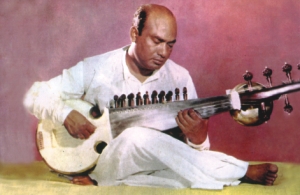By IANS,
San Anselmo/Kolkata : The world of music was in mourning after the death Friday of legendary sarod player Ali Akbar Khan – one of the greatest teachers and ambassadors of Indian classical music.
Ali Akbar, who along with his former brother-in-law Ravi Shankar took Indian classical music to the world stage, died at his residence in San Anselmo, in California, following renal failure. He was 87.

The Hindustani classical music exponent died around 10.30 a.m. India time, his secretary Ashish Roy told IANS in Kolkata.
He is survived by 11 children, including the great sarod player Ashish Khan, from his three marriages.
Born April 14, 1922, in Comilla in present-day Bangladesh, Ali Akbar Khan was the son of legendary multi-instrumentalist and musician Ustad Allauddin Khan, who founded the Maihar Gharana – the style of playing that is most closely associated with Hindustani classical music the world over.
He was awarded India’s prestigious civilian honours of Padma Vibhushan (1989) and the Padma Bhushan for his contribution to Indian classical music.
Ali Akbar is often credited with taking Indian classical music to the West ahead of sitar maestro Ravi Shankar, whose first wife was Ali Akbar’s sister Annapurna Devi, also considered to be one of the greatest exponents of the sitar and the surbahar.
Ali Akbar Khan’s contribution to the development of Indian classical music and global spread of Indian culture cannot be overstated.
Some of the finest living sarod players such as Tejendra Narayan Majumdar, Ken Zuckerman and Ashish Khan are his students, as is the tabla maestro Pandit Swapan Chaudhuri.
His Ali Akbar Khan College of Music in San Rafael near San Francisco and Switzerland has attracted thousands of students from every corner of the globe since being set up in 1967 – remaining an unparalleled institution for the teaching of Indian music and spread of Indian culture. The Ali Akbar Khan School of Music also exists in Kolkata.
He is the creator of several famous ragas, including Gauri Manjari, Lajwanti, Madhavi and Madhu Malati.
Yet, in spite of his phenomenal global success, Ali Akbar himself remained an unbelievably simple and humble son of the soil till his death – a quality that he inherited from his father, a quintessential ‘Bangaal’ from East Bengal.
The news of Ali Akbar’s death sent the world of music into mourning.
Tejendra Narayan Majumdar said the late great violinist Yehudi Menuhin once heard the sarod maestro perform and remarked that he was the best instrumentalist of all time.
“Such a musician is born once in 1,000 years. His death is a great loss to the music world,” Narayan said.
Ali Akbar, called Khansaheb by his legions of admirers, began learning music from his illustrious father at the age of three. His prodigious talent burst forth at his concert debut at the All India Music Conference in 1939 – an evening in Allahabad that opened a new chapter in Indian instrumental music by redefining the way the sarod is played.
He went on to win many awards, including the MacArthur Genius Award, honorary doctorates from prestigious universities, two Grammy nominations, the President of India Award and the most valuable of them all – the Swar Samrat (Emperor of Melody) title bestowed by his father and guru.
Boldly experimental in his attitude to Hindustani classical music – even in the way he approached traditional ragas – Ali Akbar Khan also scored music for a number of Bengali films, including “Jhinder Bandi”, “Kshudhita Pashan” and Satyajit Ray’s “Devi”.
Speaking to IANS in New Delhi, Pandit Birju Maharaj, India’s best-known Kathak exponent and a close friend of Ali Akbar, said the musician had been ailing for a long time and was on dialysis before his death.
“Ali Akbar Khan was the supreme artist in the world of sarod and the void left by his death can never be filled,” he added.

